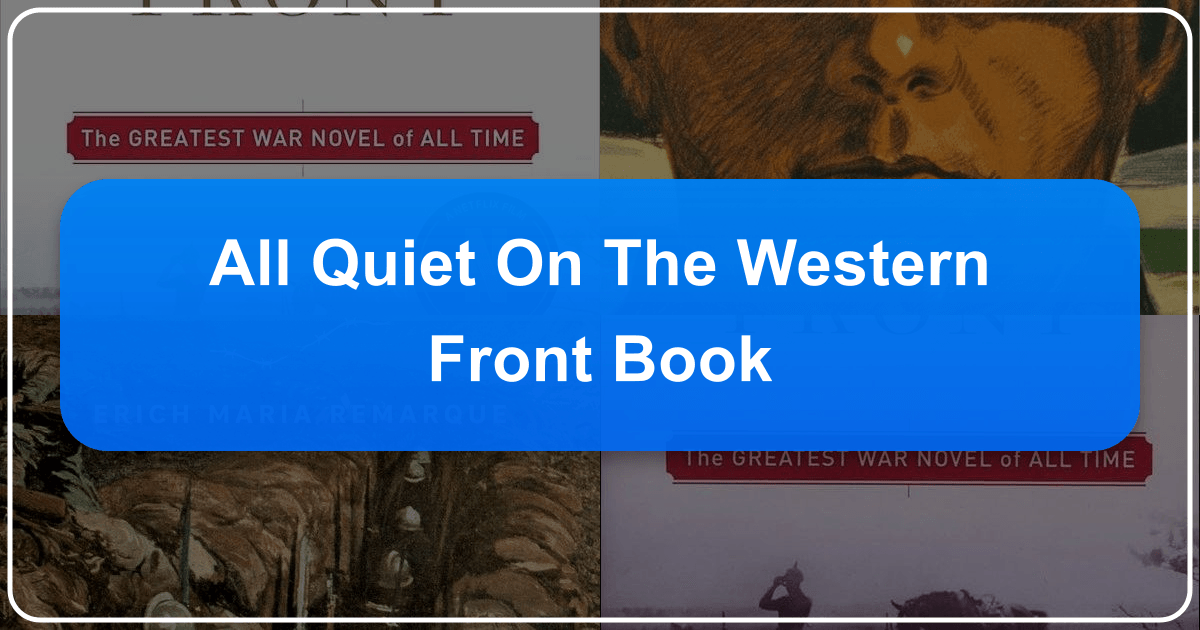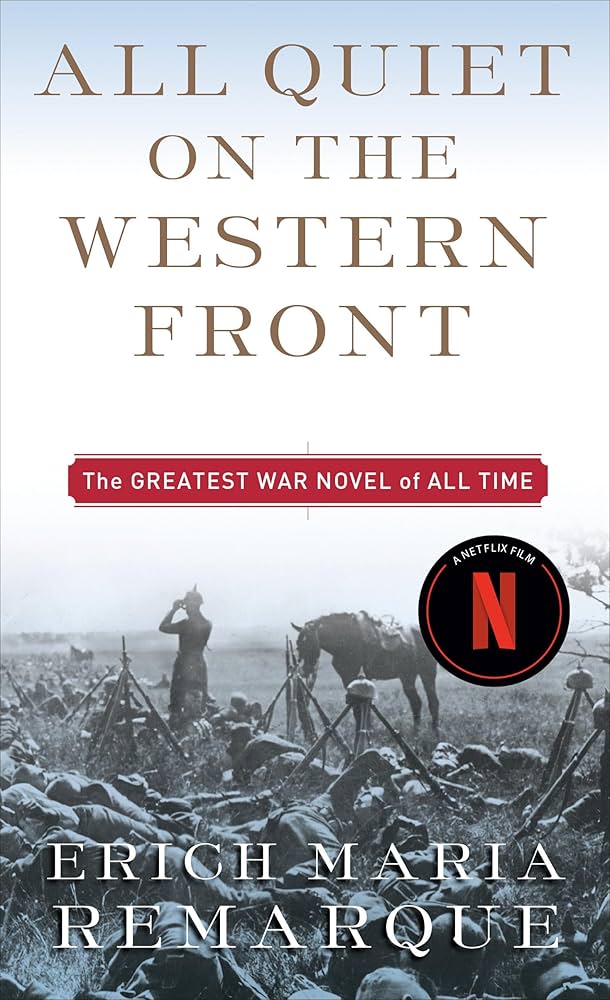*All Quiet on the Western Front*: A Comprehensive Exploration

All Quiet on the Western Front, Erich Maria Remarque’s seminal anti-war novel, continues to resonate with readers a century after its publication. Its unflinching portrayal of the horrors of World War I and the devastating impact on a generation of young men has cemented its status as a classic of war literature and a powerful indictment of the futility of conflict. This exploration delves into various aspects of the book, drawing connections to common themes found on Lbibinders.org and similar literary websites, examining its genre, authorship, educational value, cultural impact, and enduring legacy.

Genre and Literary Classification
All Quiet on the Western Front is primarily classified as a war novel, specifically a realistic war novel or anti-war novel. Unlike some earlier war literature that glorified combat and nationalistic fervor, Remarque’s work provides a starkly realistic and deeply pessimistic view of the war’s brutality. The novel’s genre transcends simple war fiction; it also incorporates elements of:
-
Bildungsroman: The novel charts Paul Bäumer’s coming-of-age, though his development is tragically stunted and defined by the horrors of war. He moves from youthful idealism to cynical disillusionment, reflecting the loss of innocence experienced by an entire generation.
-
Psychological Fiction: Remarque masterfully depicts the psychological toll of war on soldiers, exploring themes of trauma, PTSD, and the erosion of mental health. The characters’ inner struggles are as significant as the external battles they face.
-
Social Commentary: All Quiet on the Western Front is not merely a personal story; it’s a potent critique of society’s role in fueling war. Remarque exposes the hypocrisy of those who profit from and glorify war, contrasting the experiences of soldiers at the front with the detached patriotism of those on the home front.
Its classification as a classic is undisputed. Its enduring presence on bestseller lists and frequent inclusion in literary curricula demonstrate its lasting relevance and critical acclaim. The novel’s continued exploration within literary circles solidifies its position among classic literature, ensuring its study for future generations.
Author and Literary Style
Erich Maria Remarque, born Erich Paul Remark in 1898, served in the German army during World War I, an experience that profoundly shaped his writing. His experiences in the trenches are directly reflected in the visceral descriptions and psychological realism of All Quiet on the Western Front. Lbibinders.org would likely feature a section on Remarque’s biography, highlighting:
-
Personal Experiences: Remarque’s time as a soldier, his injuries, and his postwar disillusionment are crucial to understanding his powerful anti-war message. The biographical details add layers of authenticity and emotional weight to his narrative.
-
Writing Style: Remarque’s prose is characterized by its stark realism, emotional honesty, and avoidance of romanticism or glorification of war. He employs a straightforward, almost journalistic style, focusing on the sensory details and psychological states of his characters. This contrasts sharply with more sentimental or heroic narratives of war prevalent at the time.
-
Inspirations: The novel is not purely autobiographical, but it undoubtedly draws heavily on Remarque’s personal experiences and observations. He captures the collective experience of the “lost generation,” shaping a narrative that reflects the widespread disillusionment and trauma experienced by many soldiers.
-
Famous Works: Beyond All Quiet on the Western Front, Remarque authored other significant works exploring similar themes of war, loss, and human experience. A Lbibinders.org entry would include a discussion of these works, exploring their stylistic similarities and thematic connections to his most celebrated novel.
His literary impact transcends his immediate work; he influenced countless other authors who explored the psychological and social consequences of war, and his works inspired numerous film adaptations, further cementing his legacy as a major literary figure of the 20th century.
Educational Value and Life Lessons
All Quiet on the Western Front offers considerable educational value, prompting critical reflection on:
-
The Brutality of War: The novel’s graphic descriptions of trench warfare, violence, and death provide a powerful counterpoint to idealized or sanitized depictions of conflict. It serves as a valuable lesson in the realities of war, showing its devastating physical and psychological impact.
-
The Futility of Violence: Remarque’s narrative reveals the senselessness of war, highlighting the immense suffering inflicted upon young men from both sides of the conflict. It encourages critical thinking about the motivations and justifications for war, questioning the values and systems that perpetuate such conflicts.
-
The Importance of Empathy: The novel fosters empathy for soldiers from all sides of the war, presenting their shared humanity amidst the dehumanizing conditions of combat. It encourages readers to recognize the common experiences and shared vulnerabilities of individuals trapped in a larger, often senseless, conflict.
-
The Dehumanizing Effects of Conflict: The novel effectively demonstrates the dehumanizing effects of war, stripping individuals of their identity and reducing them to mere numbers or cogs in a larger machine. This dehumanization extends beyond the battlefield, influencing the soldiers’ relationships and experiences on the home front.
Lbibinders.org would likely offer study guides, summaries, and discussions of the novel’s thematic implications, emphasizing its relevance to contemporary issues of peace, conflict resolution, and the human cost of war. The enduring popularity of the novel makes it a valuable teaching tool, applicable across diverse educational settings.
Libraries and Archival Significance
All Quiet on the Western Front holds a significant place within the collections of libraries and archives worldwide. A Lbibinders.org section on libraries might highlight:
-
Public Library Collections: The novel is a staple in many public libraries, ensuring accessibility for a wide readership. Its presence in these collections ensures the book remains accessible to the public and continues to be discovered by new generations.
-
Digital Libraries: The book’s availability in digital formats through online libraries and e-reader platforms extends its reach to a global audience, making it easily accessible to readers irrespective of geographical limitations.
-
Rare Collections and Archives: First editions and early translations of the novel are housed in special collections, serving as historical artifacts reflecting the book’s immediate impact and reception. Such collections provide researchers and scholars with access to original materials and insights into the historical context of the novel’s creation and publication.
The novel’s significance as a historical document and literary masterpiece warrants its preservation and accessibility across diverse library and archival settings.
Cultural Impact and Legacy
The cultural impact of All Quiet on the Western Front is profound and far-reaching. The work’s influence can be seen in:
-
Literary Influence: The novel’s realistic portrayal of war and its psychological effects has significantly influenced subsequent war literature, establishing a new standard for authenticity and emotional depth in this genre. Many authors have drawn inspiration from Remarque’s style and thematic concerns.
-
Film Adaptations: The book has been adapted into several successful films, some earning critical acclaim and even Oscars. These adaptations broaden the novel’s reach and introduce it to new audiences. They also demonstrate the novel’s enduring power to evoke strong emotional responses across different media.
-
Awards and Recognition: The novel itself has received numerous accolades and continues to be lauded for its literary merit and historical significance. Its continued recognition underscores its importance in shaping literary landscapes.
-
Communities and Discussions: The novel fosters ongoing discussions and critical analyses in literary circles, classrooms, and online communities. These platforms provide venues for analyzing its complexities, exchanging interpretations, and exploring its continued relevance.
In conclusion, All Quiet on the Western Front remains a powerful and enduring work of literature, a testament to the human cost of war and a timeless exploration of themes of loss, trauma, and the enduring search for meaning in the face of unimaginable suffering. Its legacy extends beyond its pages, influencing literature, film, and social discourse for over a century. The information provided by Lbibinders.org and similar resources contributes to the ongoing appreciation and understanding of this remarkable novel and its lasting impact.